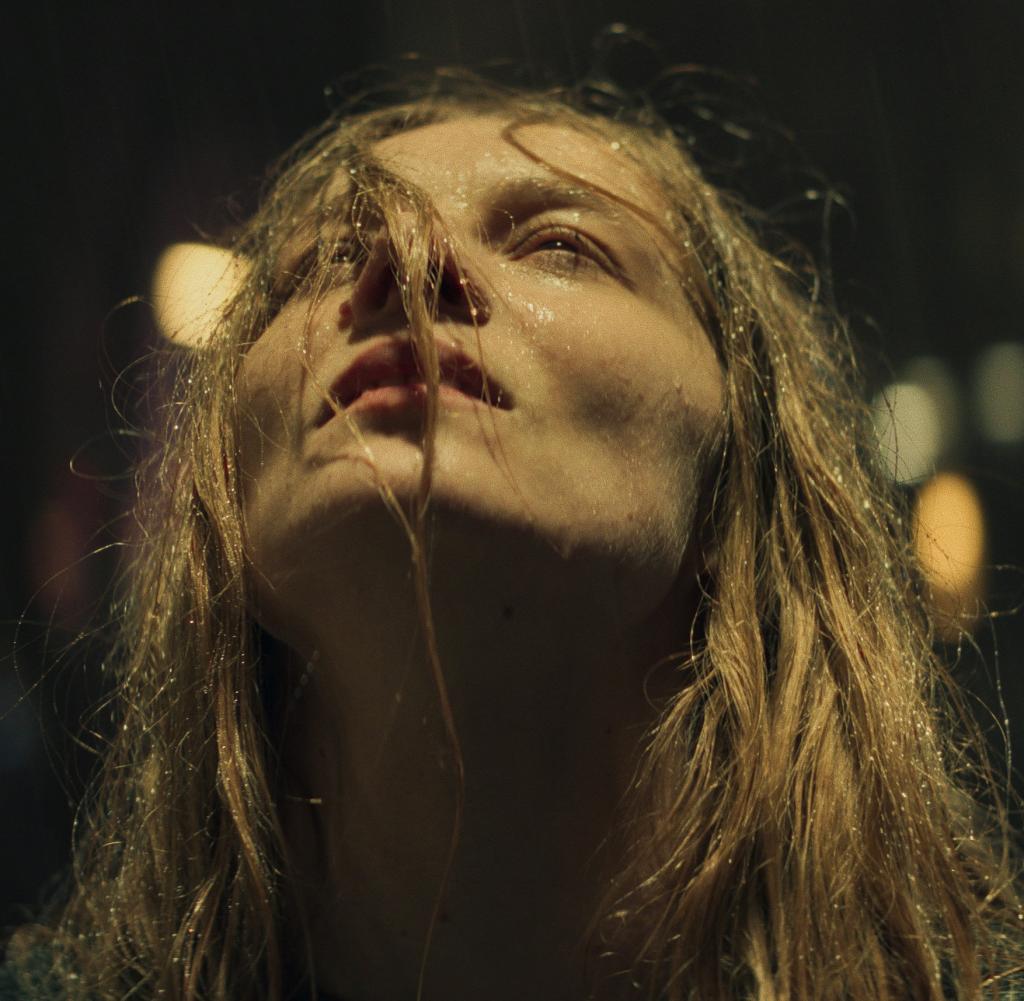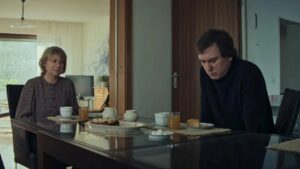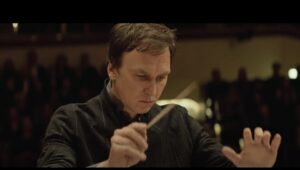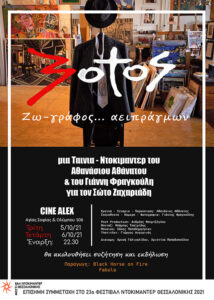DYING
Απρ 13, 2025 Κινηματογράφος 0

MOVIE REVIEW
PROTAGONISTS CHANGE
Dying: by Kallitsa Vlachou
On a thin fragile line of balance that separates (or unites? ) convention with unconventionality, death with life, love with hate, love with companionship, guilt with detachment, silences with violent outbursts, the need for communication with the shelter of loneliness, the freedom of choice with the fear that inhibits it, the power to endure with the inability to coordinate and harmonize with what is tolerable, on this line our hero Tom walks.
Dying: Unexplored universe
Between two worlds that he tries to understand and include in his own unexplored universe that is slowly revealed to him and at the same time revealed to us, through the four sections on which the film is structured.
Sections in each of which the needs, desires, and dead ends of the individuals who move around Tom’s life are mapped out, in such a way that although in each section the protagonists change, their lives are nonetheless directly connected, with threads that shape the course of our heroes within them and determine their final choices.
Each section features one of Tom’s family members, his parents and his sister. A typical German family with the problems and dysfunctions that we can find in any middle-class family in the Western world.
Dying: The pillars
There are three main pillars on which this very great film rests, which lasts for three full hours but which we don’t understand how they pass. The director, Mathias Glasner, with a disarming honesty, confronts us with our fears, our great fears of old age, of helplessness, of death, not only physical but also mental.
The fears of the heroes are our fears and they are the first pillar on which the film is built, so that we can then fully understand our heroes’ behaviour, their attitudes and their choices. On top of their big mistakes we encounter our own big mistakes.

Therein lies the second pillar, which is structured by the mistakes that played a decisive role in the lives of the protagonists and through which the blurred landscape of their lives was shaped, a chaotic world in which their needs and desires collided with their wrongly formed perception of themselves, of what others expected of them and of the wrong way they themselves perceived the messages emitted by their surroundings.
Dying: The third pillar
And the third key pillar is the clean-up. The final choices don’t just come, but through the emotional trials they put themselves through. Tough tests in which the concepts of motherhood, fatherhood, friendship, love, helping each other are put under the microscope and analysed in depth. And their analysis is done with great boldness and bravery.
Because when you analyze something and try to attribute your own meaning to it, that is, to find what all the above concepts mean to you and how you can find your own fulfillment in them, you have to get rid of them from their predetermined form in which you are trained from a young age to get used to living in, and take on the difficult and painful task of deconstructing them, breaking them down and reconstructing them in your own terms that stem from your own needs.
Then you reach the point where you are not afraid to feel that through the opposite of the opposite you breathe, you live, so that what is dead for others is alive for you and the opposite is alive for you. It is then that you discover that the tragedy of human existence lies not at the end of it, but at the end of an endeavour that you did not even bother to attempt or that you abandoned prematurely.

Dying: the unravelling
A cinema that from the very beginning sets the condition of “untangling”, which you watch if you have not only the desire, but also the need to enter this condition and only with this condition can you watch it, in order to join the heroes, to stand in front of them, not as a judge of their lives, but to feel the struggle of the search for harmony and balance that each of them is seeking from completely different paths.
But you will feel deep inside that this harmony and balance is very similar to the calm and balance you discover in an orchestral piece, where it is not performed mechanically, but within it there is the improvisation of the composer and conductor who release a rhythmic flexibility through complex counterpoint that nevertheless conveys the complex meaning of the composition, as if this composition is ultimately your own life.
The film won the Screenplay Award at the Berlin Film Festival, was screened for the first time in Greece at the 30th Athens International Film Festival Premiere Nights and is now showing in cinemas.
DYING
Directed by Matthias Glasner
Written by Matthias Glasner
Photography by Jakub Bejnarowicz
Editing: Heike Gnida
Music: Lorenz Dangel
Sound: Malte Weitkamp, Christoph Walter, Benjamin Schäfer
Costumes: Sabine Keller
Art direction: Henning Jördens
Producers: Matthias Glasner, Ulf Israel, Jan Krüger
Actors: Lars Eidinger (Tom Lounis), Corinna Harfouch (Lissy Lounis), Lilith Stangenberg (Helen Lounis), Ronald Zehrfeld (Sebastian Vogel), Robert Gwisdek (Bernard), Hans-Uwe Bauer (Gerd Lounis), Anna Bederke (Liv), Saskia Rosendahl (Ronja)
Country of production: Germany
Year of production: 2024
Language: german, english, lithuanian
Genre: tragedy, black comedy
Duration: 180΄
For more information on the casting and technical characteristics see here.
Read the reviews we have published
Σχετικά άρθρα
-
 THE RETURN OF IVAN
THE RETURN OF IVANΑπρ 15, 2025 0
-
 EN FANFARE
EN FANFAREΑπρ 12, 2025 0
-
 RETURN TO HOMELAND
RETURN TO HOMELANDΑπρ 09, 2025 0
-

Στην ίδια κατηγορία
-

-
 Η ΕΠΙΣΤΡΟΦΗ ΤΟΥ ΙΒΑΝ
Η ΕΠΙΣΤΡΟΦΗ ΤΟΥ ΙΒΑΝΑπρ 14, 2025 0
-
 ΠΡΙΝ ΤΟ ΤΕΛΟΣ
ΠΡΙΝ ΤΟ ΤΕΛΟΣΑπρ 13, 2025 0
-
 ΤΟ ΚΑΤΑ ΜΑΤΘΑΙΟΝ...
ΤΟ ΚΑΤΑ ΜΑΤΘΑΙΟΝ...Απρ 11, 2025 0
Αναζήτηση
-
 WONDER WOMAN
WONDER WOMANΙούν 09, 2017 138
-
 ΠΑΙΔΙΚΗ ΣΚΗΝΗ
ΠΑΙΔΙΚΗ ΣΚΗΝΗΟκτ 12, 2014 2
-
 ΚΛΗΡΩΣΗ ΠΡΟΣΚΛΗΣΕΩΝ
ΚΛΗΡΩΣΗ ΠΡΟΣΚΛΗΣΕΩΝΜαρ 22, 2014 2
-
 ΔΥΟ ΜΕΡΕΣ, ΜΙΑ ΝΥΧΤΑ
ΔΥΟ ΜΕΡΕΣ, ΜΙΑ ΝΥΧΤΑΝοέ 13, 2014 2
-
 ΑΧΙΛΛΕΑΣ ΨΑΛΤΟΠΟΥΛΟΣ
ΑΧΙΛΛΕΑΣ ΨΑΛΤΟΠΟΥΛΟΣΝοέ 09, 2014 2
-
 ISTABUL FILM FESTIVAL
ISTABUL FILM FESTIVALΜαρ 08, 2014 2
-

-
 THE RETURN OF IVAN
THE RETURN OF IVANΑπρ 15, 2025 0
-
 Η ΕΠΙΣΤΡΟΦΗ ΤΟΥ ΙΒΑΝ
Η ΕΠΙΣΤΡΟΦΗ ΤΟΥ ΙΒΑΝΑπρ 14, 2025 0
-

-
 ΠΡΙΝ ΤΟ ΤΕΛΟΣ
ΠΡΙΝ ΤΟ ΤΕΛΟΣΑπρ 13, 2025 0
-
 EN FANFARE
EN FANFAREΑπρ 12, 2025 0

Δείτε το τρέιλερ της ταινίας μας, που συμμετέχει το Φεστιβάλ Ντοκιμαντέρ Θεσσαλονίκης.
SOTOS, EVERLASTING PAINTER (TRAILER)
Youtube
Επικοινωνήστε
ΓΙΑΝΝΗΣ ΦΡΑΓΚΟΥΛΗΣ
Email: info@filmandtheater.gr
Τηλ: (+30) 6974123481
Διεύθυνση: Ιωαννίνων 2, 56430, Σταυρούπολη Θεσσαλονίκη
![]()

